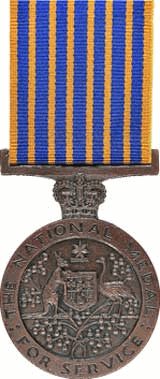The Australian honours and awards system refers to all orders, decorations, and medals, as instituted by letters patent from the Monarch of Australia and countersigned by the Australian prime minister at the time, that have been progressively introduced since 14 February 1975. The Australian honours and awards system excludes all state and local government, and private, issued awards and medals.
The Governor-General of Australia publishes the order of wearing of Australian orders, decorations and medals in the Commonwealth of Australia Gazette. The Order of Wearing Australian Honours and Awards was last published in 2007.

The Humanitarian Overseas Service Medal is an award in the Australian honours system. The award is presented to those who perform humanitarian service in a foreign country, in particular those working in dangerous environments or conditions or during a humanitarian crisis. The award was introduced by letters patent on 16 April 1999, following a review of the Australian honours and awards system beginning in 1995.

The National Medal is an Australian award given for long service by operational members of specified eligible organisations. It was introduced in 1975, as an original component of the new Australian honours system, and replaced a range of medals available to military and civilian uniformed services for long service and good conduct. The eligible groups have in common that their members serve or protect the community at the risk of death, injury or trauma, hence it is only available to members of the eligible organisations who are operationally deployed. In the case of corrective services, eligibility is restricted to officers with custodial duties.
The Australian Police Medal (APM) is awarded for distinguished service by a member of an Australian police force. The APM was introduced in 1986, and replaced the Imperial King’s Police Medal for Gallantry and King’s Police Medal for Distinguished Service.
The Australian Fire Service Medal (AFSM) is awarded for distinguished service by a member of an Australian fire service. The AFSM was introduced in 1988, and replaced the Imperial awards of the Queen's Fire Service Medal for Gallantry and the Queen's Fire Service Medal for Distinguished Service. Recipients of the Australian Fire Service Medal are entitled to use the post-nominal letters "AFSM".
The Ambulance Service Medal (ASM) is awarded for distinguished service by a member of an Australian ambulance service. The ASM was introduced in 1999.

The National Emergency Medal is an award of the Australian honours system given for sustained service during a nationally significant emergency; or to other persons who rendered significant service in response to such emergencies. The medal was established by Queen Elizabeth II in October 2011. The medal is awarded for events specifically set out by regulation or may be awarded upon the recommendation of the National Emergency Medal Committee for significant service.
The 2010 Australia Day Honours are appointments to various orders and honours to recognise and reward good works by Australian citizens. The list was announced on 26 January 2010 by the Governor General of Australia, Quentin Bryce.
The 2013 Australia Day Honours were announced on 26 January 2013 by the Governor-General of Australia, Quentin Bryce.
The Order of Wearing of Australian honours includes Imperial honours if they were awarded prior to 6 October 1992. Imperial honours awarded after 5 October 1992 are considered foreign.
The 2016 Queen's Birthday Honours for Australia were announced on 13 June 2016 by the Governor-General, Sir Peter Cosgrove. The Birthday Honours were appointments by some of the 16 Commonwealth realms of Queen Elizabeth II to various orders and honours to reward and highlight good works by citizens of those countries. The Birthday Honours are awarded as part of the Queen's Official Birthday celebrations during the month of June.
The 2017 Australia Day Honours were announced on 26 January 2017 by the Governor General of Australia, Sir Peter Cosgrove.
The 2017 Queen's Birthday Honours for Australia were announced on 12 June 2017 by the Governor-General, Sir Peter Cosgrove.

The Australian Corrections Medal (ACM) is a civil decoration awarded to Australian correctional service members for distinguished service. The ACM was introduced on 19 June 2017. Recipients of the Australian Corrections Medal are entitled to use the post-nominal letters "ACM".
The 2009 Australia Day Honours are appointments to various orders and honours to recognise and reward good works by Australian citizens. The list was announced on 26 January 2009 by the Governor General of Australia, Quentin Bryce.
The 2008 Australia Day Honours are appointments to various orders and honours to recognise and reward good works by Australian citizens. The list was announced on 26 January 2008 by the Governor General of Australia, Michael Jeffrey
The 2007 Australia Day Honours are appointments to various orders and honours to recognise and reward good works by Australian citizens. The list was announced on 26 January 2007 by the Governor General of Australia, Michael Jeffrey
The Australian Intelligence Medal (AIM) is a civil decoration awarded to national intelligence community members for distinguished service. The decoration was introduced on 24 January 2020. Recipients of the Australian Intelligence Medal are entitled to use the post-nominal letters "AIM".

The King Charles III Coronation Medal is a commemorative medal created to mark the coronation of King Charles III and Queen Camilla, which took place on 6 May 2023.





